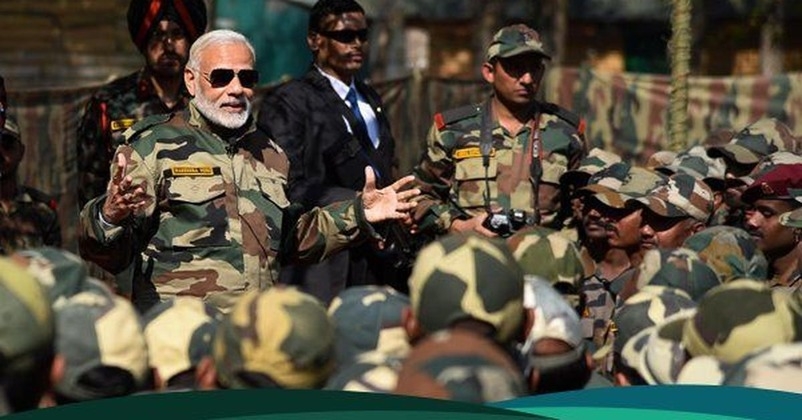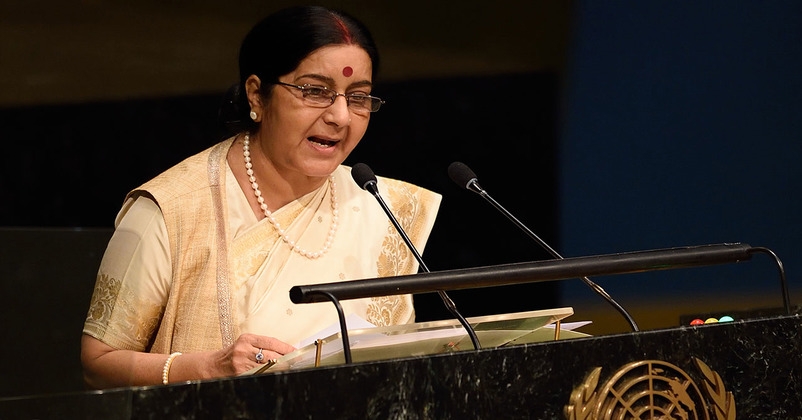India to use these three weapons against Pakistan
| 15-Feb-2019 |

42 CRPF soldiers were martyred on Thursday when the Jaish-E-Mohammad terrorist rammed his explosive-laden car in a bus carrying the CRPF soldiers. The explosion was so intense that the sound of it could be heard from as far as 10 km away from the place of explosion. National and international communities have strongly condemned the attack on CRPF soldiers.
Pakistan based Jaish-E-Mohammad took the responsibility of the IS style terror attack, wherein Adil Ahmad Dar alias Waqas Commando of Gundibagh, Kakpora Pulwama blew up the car causing grave causalities. Though Pakistan always remains in denial mode yet it never clears its territory of terrorists and the latest attack was planned in by Jaish Chief Masood Azhar in Pakistan.
Taking a serious note of the situation, the Cabinet Committee on Security (CCS) met on Friday morning to discuss the security situation in Jammu and Kashmir in wake of this attack. After the meeting, Finance Minister Arun Jaitley said the security forces will take all the required steps to ensure the security of the nation and the perpetrators of Pulwama attack will pay the heavy price for it. He said all the diplomatic steps will be used to completely isolate Pakistan from the international community. He added that India is withdrawing the Most Favoured Nation (MFN) status from Pakistan and ensure that the Comprehensive Convention on International Terrorism is adopted at the earliest.
Isolation of Pakistan
Pakistan is the safe haven for the terrorists and India has been consistently asking Pakistan not allow terrorism to breed in its backyard. The diplomatic efforts of India have also been helping in isolating Pakistan globally. America has been issuing warning to Pakistan to destroy all the safe havens of terrorists. Last year, US suspended $1.66 billion in security assistance to Pakistan. In BRICS submit, veiled reference was made to Pakistan and for the first time Pakistan-based terror groups like the LeT and the JeM were blamed for causing violence in the region. Habib Bank, one of the largest private banks in Pakistan has been made to close down in New York for alleged terror funding and money laundering. The endeavor of India to isolate Pakistan diplomatically could now entail more economic sanctions from the US, the European Union (EU) and other major powers; having Pakistan designated as terrorist nations; ban on sales of weapons, nuclear fuel, armaments and other critical military equipment and; ban on all kinds of development aid.
Withdrawal of Most Favoured Nation (MFN) status
MFN is a non-discriminatory trade policy as it ensures equal trading among all WTO member nations rather than exclusive trading privileges. Under it, an international trade partner has to ensure non-discriminatory trade between all partner countries of the WTO. India conferred MFN status to Pakistan in 1996. Both India and Pakistan are signatories to it in accordance with the provision of Article 1 of the General Agreement on Tariffs and Trade, 1994. Removal of this status means India can enhance custom duties to any extent on the goods coming from Pakistan.

Comprehensive Convention on International Terrorism (CCIT)
The CCIT provides a legal framework that binds all the signatories to deny funds, arms and safe havens to the terrorist groups. The convention criminalizes all forms of terrorism and the main objectives of the convention was to provide definition of international terrorism that can be integrated by 193 member countries in their respective criminal laws, ban terror groups and shut down terror camps, prosecute terrorists under special laws and ensure smooth extradition of terrorists from one country to the other. This convention was proposed by India but it is yet to be passed. The deadlock of the convention remained mainly because of the US and the Organization of Islamic Countries (OIC) who wanted certain exclusions to serve their own interests. Therefore, the convention is still under negotiation at United Nations General Assembly's Ad Hoc Committee established by Resolution 51/210 of 17 December 1996 on Terrorism and the United Nations General Assembly Sixth Committee (Legal). But the discussion on this convention has yielded three protocols viz. International Convention for the Suppression of Terrorist Bombings, adopted on 15 December 1997; International Convention for the Suppression of the Financing of Terrorism, adopted on 9 December 1999; and International Convention for the Suppression of Acts of Nuclear Terrorism, adopted on 13 April 2005. In 2016, also India once again reminded the international community about it and urged them to pass this important convention. Pakistan would face greater difficulty if India manages to get this convention through from the international community.
The entire world has seen the cowardly attack on the peace-loving country and condemned the act of terror in strong terms. But only condemnation will not work unless it is ensured by some concrete actions. Therefore, the international community must take some concrete measures in this regard and support India’s initiative in counter-terrorism measures.